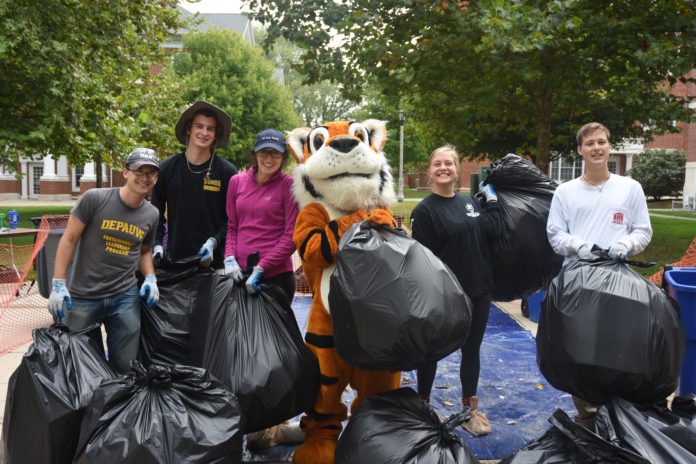

Approximately 40 percent of food goes to waste here in America according to the Food and Agriculture Organization of the United States. DePauw University is hoping to lower this number through sustainability initiatives.
Being an all-you-can-eat food service, Bon Appetit has found it difficult to limit its food waste in the past. In alliance with the Office of Sustainability, Bon Appetit is currently taking action to reduce the amount of food waste of campus dining.
General Manager for Bon Appetit, John Hecko and Executive Chef of Bon Appetit, Jordan Hall are at the forefront of reducing food waste in campus dining. “We would like to get to zero waste facilities,” said Hecko, and this change appears to be working for Bon Appetit. Since the alliance with the Office of Sustainability, Bon Appetit has been able to begin initiatives such as reusable carry-out boxes and composting.
The first action for Bon Appetit is repurposing of food scraps. “We try to make infused water with fruit peelings,” Hall said. “We also repurpose food to feed the less fortunate.”
However, even after the repurposing of food scraps there’s still food waste. Therefore, Bon Appetit donates most of its food waste from campus dining to local farmers who feed it to their pigs.
Bon Appetit has also began composting some of its food waste. Composting allows the decomposition of organic material such as food so it can be recycled into nutrient-rich soils that are environmentally beneficial compared to harmful fertilizers and pesticides.
The Hoover Dining Hall has also aided Bon Appetit in terms of limiting waste. When one enters the spacious dining hall of Hoover, it appears as though the only source of garbage disposal is located by the dish conveyor belt. The single source of trash disposal was purposefully implemented by Bon Appetit to limit food waste.
“We keep most of our trashcans in the basement,” Hecko said. Bon Appetit has also eliminated trays in Hoover dining hall which forces students to take smaller helpings.
Bon Appetit has found that one of the best options in the campaign to limit food waste is to directly speak with students. “Coming out into the dining hall and rounding students and talking to them about what they’re having and what they would like and by giving them what they want, we limit food waste,” said Hecko.
Although there is no effective way of eliminating all food waste, Bon Appetit has continued to take action to limit food waste produced here on campus. Bon Appetit realizes that the best method for limiting food waste is not a single initiative, but rather requires the combined effort of the student body.
“It’s not going to work with only Bon Appetit,” said Hecko. “It’s much easier when the student body is involved.”
“Sometimes the eyes are a little bigger than the stomach,” Hall said. “It’s important to stay conscious.”
Sophomore and participant in the Sustainability Leadership Program, Lewis Andrews also realizes the importance of the student in limiting food waste. “Save food for later rather than throwing it away,” said Andrews. “It’s about getting as much food as you will eat.”
